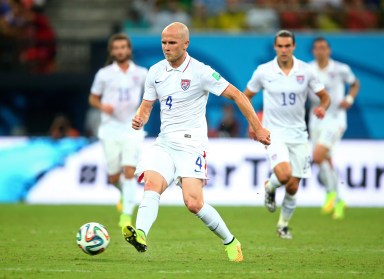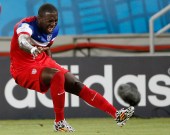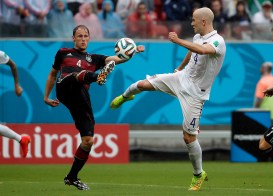SAO PAULO – Michael Bradley had a rough World Cup. The 26-year-old midfielder struggled to connect his passes, failed to find the back of the net, and never really found his rhythm.
The day after the United States’ exit in the Round of 16, Bradley’s performance is coming under criticism. Did the most reliable player on the U.S. roster – not named Tim Howard – choke in the spotlight?
It’s not that simple. Bradley’s struggle wasn’t the result of a drop in ability. Some of it falls on his shoulders of course, but most of it is an amalgamation of the ails which plagued the U.S. throughout the World Cup.
Jozy Altidore got hurt.
When Jozy Altidore pulled up with a hamstring injury 20 minutes into the World Cup, it threw the U.S. lineup into flux. Coach Jurgen Klinsmann brought in an extra midfielder to cover the loss, leaving Clint Dempsey to play as the lone striker.
With the shift, Bradley was asked to cover Dempsey’s role as a second supporting striker but no one filled Bradley’s place as a true central midfielder. Both Jermaine Jones and Kyle Beckerman played as holding defensive midfielders, often being called to cover the outside backs during the first three matches.
Neither Jones or Beckerman were capable of getting into the advanced positions Bradley has typically occupied over the past four years. No one was able to control the tempo or dictate possession either.
Clint Dempsey needed support.
A formation that uses a lone striker, like the U.S. did with Dempsey in this World Cup, requires a central midfielder to be an outlet for that striker. Essentially, Dempsey was playing one against four every time he received the ball, unless Bradley was there in support.
Too often, Bradley was the one finding Dempsey from deeper in the play, picking the ball up from Beckerman and Jones in the defensive half of the field. Once Bradley plays that ball, he was then asked to make the 30-40 yard run necessary to support it. Simply put, no player in the world can do that for 90 minutes. Bradley spoke a bit about how much work he had to put in during the group stage in the week leading up to the U.S. match against Belgium.
“Every guy should be proud of what we’ve done as a team and also individually,” Bradley said. “Up until now, it’s been really positive in every way. You get to this point in the tournament and you understand that to keep it going and to take it even further, every guy has to find more. Every guy has to look at himself and physically find more to give, mentally be that much sharper.”
Bradley tried to do too much.
Bradley’s quote speaks to the fighting mentality that has made him such a great player for the U.S., and professionally for AS Roma and Toronto FC. He’s always possessed a willingness to cover the ground asked of him. Unfortunately, that willingness got the better of him against Belgium.
Bradley attempted to be all roles for all people and in doing so, found himself getting caught in possession in compromising positions.
“I think as fans we have admired teams who have gone for it and we said to ourselves whenever we are going home – we wanted to go home going for it, and we did.” Bradley said after the Belgium match. “That is part of the progression for us, you’re now able to play games like this, regardless of who you play against … to play on even terms, and I think in this World Cup, we were able to do that.”
The mentality is admirable, though in action, it proved flawed. Bradley couldn’t be all roles in all places at all times. Something was bound to give out, and it did. Unfortunately for Bradley, the thing that suffered most was his effectiveness.










